Background
Courtwright, David Todd was born on April 10, 1952 in Kansas City, Missouri, United States. Son of Robert Thomas and Elizabeth Beatrice (Brown) Courtwright.

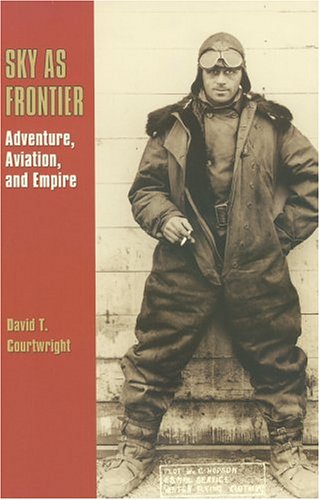
( The airplane changed the course of history. Above all, ...)
The airplane changed the course of history. Above all, it changed the history of the United States. When the Wright brothers invented their flying machine, Americans lived in a nation of two dimensions, circumscribed by lines drawn on a conventional map. A century later, their nation existedin fact, reignedin three dimensions. Two million Americans slipped the surly bonds of earth daily, carried aloft by aircraft operating in every part of the world. The airplane turned the sky into a new domain of human activity, a fast-developing frontier. The first to brave that frontier were adventurous young men. Then came the rich and the hurried. Then just about everybody else. Until now, no one has told the story of aviation as one of frontier expansion. David Courtwright does so in Sky as Frontier. He has written an ambitious history of American aviation ranging from the patent fight between the Wright brothers and Glenn Curtiss through the tragedy of 9/11 and the Iraq War. Along the way, Courtwright stops to consider dogfighting, barnstorming, the first air mail pilots, the development of airlines, air power during World War II, flight’s impact on the environment, the troubled space frontier, and how the male-dominated aviation enterprise was domesticated and democratized. Aviation’s frontier stage lasted a scant three decades, then vanished as flying became a settled experience. Sky as Frontier recreates that pioneer world and shows how commercial and military imperatives destroyed it by routinizing flight. At bottom, it is the story of a fateful tradeoff. Rationalization killed the adventure in flying but made possible rapid aerial expansion. With it came commercial growth and glob8al military reach. In no other country did social life, business, and military operations become so intertwined with aerospace advances, or have such large consequences for national power and prestige.
http://www.amazon.com/gp/product/1585444197/?tag=2022091-20
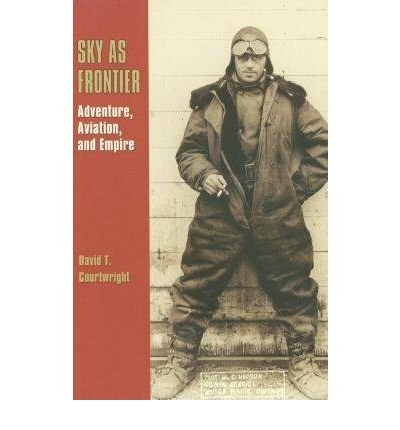
(Sky as Frontier: Adventure, Aviation, and Empire (Centenn...)
Sky as Frontier: Adventure, Aviation, and Empire (Centennial of Flight Series) (Hardback)
http://www.amazon.com/gp/product/B00EQCAFZ8/?tag=2022091-20
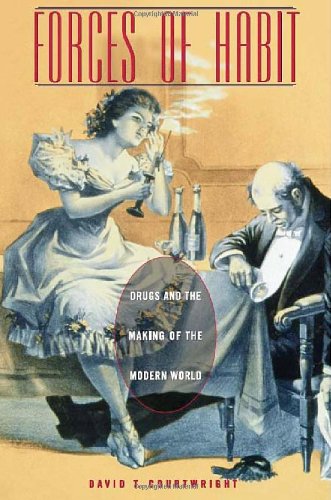
(What drives the drug trade, and how has it come to be wha...)
What drives the drug trade, and how has it come to be what it is today? A global history of the acquisition of progressively more potent means of altering ordinary waking consciousness, this book is the first to provide the big picture of the discovery, interchange, and exploitation of the planet's psychoactive resources, from tea and kola to opiates and amphetamines.
http://www.amazon.com/gp/product/0674010035/?tag=2022091-20
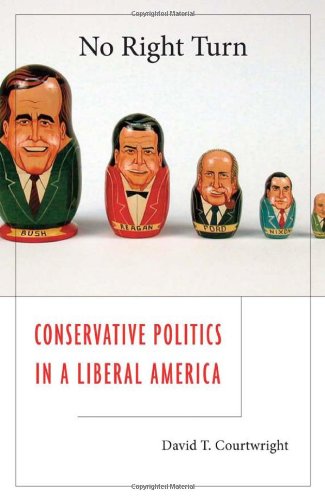
( Few question the “right turn” America took after 1966,...)
Few question the “right turn” America took after 1966, when liberal political power began to wane. But if they did, No Right Turn suggests, they might discover that all was not really “right” with the conservative golden age. A provocative overview of a half century of American politics, the book takes a hard look at the counterrevolutionary dreams of liberalism’s enemies—to overturn people’s reliance on expanding government, reverse the moral and sexual revolutions, and win the Culture War—and finds them largely unfulfilled. David Courtwright deftly profiles celebrated and controversial figures, from Clare Booth Luce, Barry Goldwater, and the Kennedy brothers to Jerry Falwell, David Stockman, and Lee Atwater. He shows us Richard Nixon’s keen talent for turning popular anxieties about morality and federal meddling to Republican advantage—and his inability to translate this advantage into reactionary policies. Corporate interests, boomer lifestyles, and the media weighed heavily against Nixon and his successors, who placated their base with high-profile attacks on crime, drugs, and welfare dependency. Meanwhile, religious conservatives floundered on abortion and school prayer, obscenity, gay rights, and legalized vices like gambling, and fiscal conservatives watched in dismay as the bills mounted. We see how President Reagan’s mélange of big government, strong defense, lower taxes, higher deficits, mass imprisonment, and patriotic symbolism proved an illusory form of conservatism. Ultimately, conservatives themselves rebelled against George W. Bush’s profligate brand of Reaganism. Courtwright’s account is both surprising and compelling, a bracing argument against some of our most cherished clichés about recent American history.
http://www.amazon.com/gp/product/0674046773/?tag=2022091-20
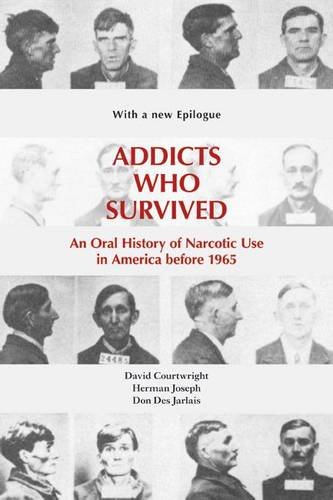
( The authors employ the techniques of oral history to pe...)
The authors employ the techniques of oral history to penetrate the nether world of the drug user, giving us an engrossing portrait of life in the drug subculture during the "classic" era of strict narcotic control. Praise for the hardcover edition: "A momentous book which I feel is destined to become a classic in the category of scholarly narcotic books." —Claude Brown, author of the bestseller, Manchild in the Promised Land. "The drug literature is filled with the stereotyped opinions of non-addicted, middle-class pundits who have had little direct contact with addicts. These stories are reality. Narcotic addicts of the inner cities are both tough and gentle, deceptive when necessary and yet often generous--above all, shrewd judges of character. While judging them, the clinician is also being judged." —Vincent P. Dole, M.D., The Rockefeller Institute. "What was it like to be a narcotic addict during the Anslinger era? No book will probably ever appear that gives a better picture than this one. . . . a singularly readable and informative work on a subject ordinarily buried in clichés and stereotypes." —Donald W. Goodwin, Journal of the American Medical Association " . . . an important contribution to the growing body of literature that attempts to more clearly define the nature of drug addiction. . . . This book will appeal to a diverse audience. Academicians, politicians, and the general reader will find this approach to drug addiction extremely beneficial, insightful, and instructive. . . . Without qualification anyone wishing to acquire a better understanding of drug addicts and addiction will benefit from reading this book." —John C. McWilliams, Pennsylvania Magazine of History and Biography "This study has much to say to a general audience, as well as those involved in drug control." —Publishers Weekly "The authors' comments are perceptive and the interviews make interesting reading." —John Duffy, Journal of American History "This book adds a vital and often compelling human dimension to the story of drug use and law enforcement. The material will be of great value to other specialists, such as those interested in the history of organized crime and of outsiders in general." —H. Wayne Morgan, Journal of Southern History "This book represents a significant and valuable addition to the contemporary substance abuse literature. . . . this book presents findings from a novel and remarkably imaginative research approach in a cogent and exceptionally informative manner." —William M. Harvey, Journal of Psychoactive Drugs "This is a good and important book filled with new information containing provocative elements usually brought forth through the touching details of personal experience. . . . There isn't a recollection which isn't of intrinsic value and many point to issues hardly ever broached in more conventional studies." —Alan Block, Journal of Social History
http://www.amazon.com/gp/product/1572339373/?tag=2022091-20
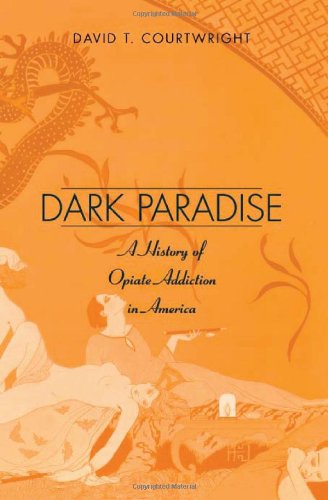
( In a newly enlarged edition of this eye-opening book, ...)
In a newly enlarged edition of this eye-opening book, David T. Courtwright offers an original interpretation of a puzzling chapter in American social and medical history: the dramatic change in the pattern of opiate addiction--from respectable upper-class matrons to lower-class urban males, often with a criminal record. Challenging the prevailing view that the shift resulted from harsh new laws, Courtwright shows that the crucial role was played by the medical rather than the legal profession. Dark Paradise tells the story not only from the standpoint of legal and medical sources, but also from the perspective of addicts themselves. With the addition of a new introduction and two new chapters on heroin addiction and treatment since 1940, Courtwright has updated this compelling work of social history for the present crisis of the Drug War.
http://www.amazon.com/gp/product/0674005856/?tag=2022091-20
Courtwright, David Todd was born on April 10, 1952 in Kansas City, Missouri, United States. Son of Robert Thomas and Elizabeth Beatrice (Brown) Courtwright.
Bachelor in English, University Kansas, 1974. Doctor of Philosophy in History, Rice University, 1979.
Assistant professor history University Hartford, West Hartford, Connecticut, 1979-1985, associate professor, 1985-1988, chairman department, 1979-1988. Professor history University North Florida, Jacksonville, since 1988, chairman department, 1988-1995, presidential professor, since 2005. Member substance abuse committee Institute Medicine, Washington, 1988-1990.
(What drives the drug trade, and how has it come to be wha...)
( The authors employ the techniques of oral history to pe...)
(In this eye-opening book, David Courtwright offers an ori...)
( Few question the “right turn” America took after 1966,...)
(Sky as Frontier: Adventure, Aviation, and Empire (Centenn...)
( In a newly enlarged edition of this eye-opening book, ...)
(Book by David Courtwright, Herman Joseph, Don Des Jarlais)
( The airplane changed the course of history. Above all, ...)
Trustee Mark Twain Memorial, Hartford, 1982-1988. Member American History Association, Organization American Historians, American Association for History Medicine, National History Center (founding member), Phi Beta Kappa Alumni Association Northeast Florida (president 1992-1993, since 2009, vice president 1994-1997), Alcohol & Drugs History Society (president since 2009).
Married Shelby Marie Miller, December 29, 1976. Children: Andrew Miller, Paul Miller.
